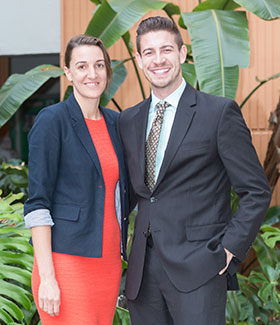 University of Miami School of Law Dean Emerita and Professor of Law Emerita Mary Doyle was deputy general counsel of the U.S. Environmental Protection Agency during the administration of President Jimmy Carter. She also served in the U.S. Department of the Interior as acting assistant secretary of the interior for water and science and as chair of an intergovernmental panel coordinating a massive 20-year $7.3 billion Everglades restoration program.
University of Miami School of Law Dean Emerita and Professor of Law Emerita Mary Doyle was deputy general counsel of the U.S. Environmental Protection Agency during the administration of President Jimmy Carter. She also served in the U.S. Department of the Interior as acting assistant secretary of the interior for water and science and as chair of an intergovernmental panel coordinating a massive 20-year $7.3 billion Everglades restoration program.
With those kinds of bona fides, it does not surprise that Doyle was named founding co-director of the University's Abess Center for Ecosystem Science & Policy in 2003.
During her tenure at Miami Law, Doyle taught property, land use, and water law.
Last week, the Mary Doyle Fellowship at the University of Miami was established in her honor. The Doyle Fellowship, a joint initiative between the School of Law and Abess Center, is awarded to extraordinary students admitted into the University’s joint J.D./Abess Center Environmental Science and Policy Ph.D. program. These students will be known as Doyle Fellows.
"It was through your unwavering efforts that the Abess Center exists. We cannot thank you enough for all that you have done to build up the Center and its programs and help to make it what it is today – a unique, interdisciplinary force that exists as the environmental hub on the UM campus," Dean Patricia D. White and Kenny Broad, director of the Abess Center, wrote in a letter to Doyle. "Additionally, your years of service to the School of Law and impact on thousands of students are a part of the University’s legacy. We feel this is a heartfelt way to show you our sincerest gratitude while bestowing this great honor on highly motivated and dedicated students."
The inaugural Doyle Fellows are Annie Brett and Johnny Bartz.
Anne Brett received a B.A. in Environmental Science and Policy from Harvard University and has a background in sailing and marine conservation. She has done work as a Gardner Fellow researching climate change impacts in the Pacific islands and as the program director for the international nonprofit Sailors for the Sea.
The 28-year-old who grew up in coastal Maine has extensive sailing experience, at one point captaining a 120-foot expedition vessel over 40,000 blue water miles. Building on both her sailing and professional background, Brett is interested in exploration science and marine conservation; particularly how citizen science projects can be used to fill data gaps and informs conservation decisions on the high seas. Brett is working with Broad and is a member of the Abess Center’s Broad Lab. A UM Fellow and Doyle Fellow, Brett is in her second year at Miami Law.
“It is a fantastic honor to be named one of the inaugural Doyle fellows,” said Brett. “The joint J.D./Ph.D. program has provided me with the unique opportunity to directly combine research in law, science and policy, an unparalleled preparation for a career that I can only hope follows in Mary Doyle's momentous footsteps.”
Bartz's undergraduate research focused on the conservation of several Brazilian macaw species and promoting environmental literacy and sustainable development in local populations through ecotourism. As a Master’s student, he worked with Professor Robert Dunbar to study in situ versus satellite remote-sensed temperature data at the Palmyra Atoll to better understand the limitations of coral bleaching predictions from satellite data.
After graduating, the 28-year-old from Minneapolis, Minnesota received a Fulbright Scholarship for research in Brazil, where he constructed Brazil’s first in situ coral nursery and started a long-term ecosystem restoration project in Búzios, Rio de Janeiro. At UM, Bartz works with Broad and Dr. Andrew Baker in the Coral Reef Conservation Research Laboratory to study assisted coral migration as a climate change adaptation strategy. His research uses regional climate modeling to assess future temperature conditions, molecular techniques to study coral and symbiont physiology, as well as policy and legal analysis to predict future conservation strategies. Bartz is a member of the Abess Center's Broad Lab and is a UM Fellow and Doyle Fellow. He is in his second year at Miami Law.
CONTACT: Catharine Skipp at 305-284-9810 or cskipp@law.miami.edu

